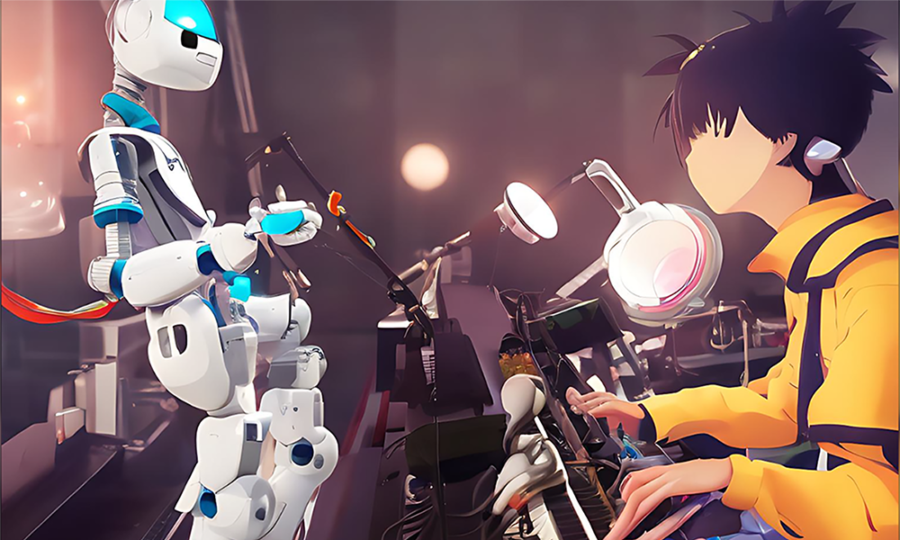As we move further into the digital age, Artificial Intelligence (AI) is rapidly transforming the music industry. AI is revolutionizing how music is created, produced, and consumed, creating new opportunities for musicians while raising critical questions about the nature of artistic expression. In this article, we’ll explore how AI is reshaping music, from composition to production, and the ethical considerations surrounding its integration into the creative process.
AI and the Evolution of Music Composition
AI’s impact on music composition is one of the most groundbreaking developments in the industry. Advanced AI algorithms are now capable of analyzing vast libraries of existing music to generate new melodies, harmonies, and rhythms. These AI systems can create musical pieces that challenge traditional songwriting conventions, offering musicians an entirely new set of creative tools.
By incorporating AI into their workflows, artists can experiment with innovative songwriting techniques that blend human creativity with machine learning. This collaboration allows for the fusion of different genres and styles, expanding the boundaries of what music can be. With AI’s help, musicians can explore new sounds that may have once been difficult or impossible to achieve, opening doors for unique and unconventional compositions.
AI Streamlining Music Production
Beyond composition, AI is revolutionizing music production by simplifying time-consuming tasks such as mixing, mastering, and arranging. Machine learning-powered software tools are now available to both professional producers and independent creators, making it easier to achieve high-quality sound without extensive technical expertise.
This democratization of music production is empowering a new wave of artists who may not have the resources to access expensive studios or equipment. As technology streamlines the production process, musicians can focus more on creative expression rather than on the technical aspects of sound engineering. This shift is fostering a new era of experimentation, where emerging artists can bring their musical visions to life with ease.
Data-Driven Insights for Musicians and Music Marketing
AI is also providing valuable data-driven insights that can help musicians better understand listener preferences and track emerging trends. By analyzing streaming data, social media activity, and audience feedback, AI platforms give artists the tools to make informed decisions about their music.
These insights help musicians refine their songwriting, adapt their content for specific audiences, and optimize their marketing strategies. As a result, artists can engage with fans on a deeper level, crafting music that resonates with their audience’s tastes. However, this reliance on data has sparked debates over the potential commodification of creativity, as artists may feel pressured to prioritize market demands over personal artistic expression.
The Ethical Implications of AI in Music Creation
The increasing role of AI in music creation has raised important ethical questions. One of the primary concerns is that AI could diminish the role of human musicians, relegating them to curators of machine-generated content. This shift might transform the music creation process from a deeply personal and emotional experience into something driven by algorithms and data, stripping away the human touch that has historically defined music.
For many artists, the risk lies in losing their unique voice amidst a sea of AI-generated outputs. As AI continues to evolve, musicians must navigate the delicate balance between embracing these new technologies and maintaining their individual artistic identities. The question arises: can the essence of music remain intact when human creativity is augmented, or even replaced, by machines?
The Changing Role of Musicians in the AI Age
As AI reshapes the music industry, the role of the musician is also changing. Artists are no longer solely responsible for every aspect of their creative output; now, they must manage the interaction between human intuition and AI-generated content. This evolution forces musicians to redefine what it means to be an artist in a world where machines can produce music that rivals human composition.
Rather than seeing AI as a threat, musicians are beginning to embrace it as a valuable tool for collaboration. Those who adapt to this new paradigm can harness AI’s potential to enhance their creative process, while still maintaining their individuality. The ability to integrate AI into the creative workflow opens up new possibilities for musical expression and innovation.
The Future of Music, Collaboration Between Humans and AI
The future of music lies in collaboration between human artists and AI. Far from replacing musicians, AI has the potential to act as a catalyst for innovation, inspiring artists to push the boundaries of creativity. By experimenting with AI-generated compositions, musicians can reinterpret these pieces through their own perspectives, producing unique works that blend human and machine influences.
This collaborative approach could lead to a new era of music where technological advancements enrich the creative process, rather than stifle it. As AI continues to improve, it will offer artists more opportunities to experiment with sound, genre, and form, ultimately reshaping the landscape of music in exciting and unexpected ways.
Navigating the AI-Driven Musical Landscape
The integration of AI into the music industry is undeniably transforming the creative process, but it also raises important challenges for musicians. As technology advances, artists must find ways to navigate this evolving terrain while preserving their authentic voices. The intersection of AI and music invites questions about the future of creativity, authenticity, and artistic expression.
Ultimately, the future of music will likely see a blending of human artistry and artificial intelligence, where musicians can use AI as a tool to enhance and expand their work. The relationship between musicians and technology will continue to evolve, pushing the boundaries of what is possible in music. As AI continues to advance, it will play an increasingly vital role in shaping the next generation of musical innovation.









